#ursula leguin
Explore tagged Tumblr posts
Text
Midnight Pals: Omelas Solvers
Stephen King: so ursula we're all been thinking it over King: and i think we finally figured out a solution for omelas Ursula Le Guin: why are you doing this King: no no we've really got it this time Le Guin: that's not the point of the story King: King: c'mon aren't you even curious?
Le Guin: ok fine Le Guin: what's your solution King: ok so omelas doesn't control the sky King: What if the kid lived in a balloon? Le Guin: oh christ that's the worst one yet
King: ok look guys let's put our heads together and solve this omelas problem once and for all King: i want your best answers King: GO! Sean Vivier: what if we got rid of the bad things about omelas but kept the good things? King: see, now THAT is the kind of outside the box thinking we need right now
Isabel J Kim: or we could just kill the kid? NK Jemisin: wait i got a better one Jemisin: what if we left the kid but killed everyone else? Mary Shelley: honestly both of these ideas sounding pretty ok to me so far
King: ok so imagine that we're all in Omelas King: how would we solve this problem? Mary Shelley: do i have my knife in this scenerio King: uhhh sure why not Lovecraft: nuh uh, she wouldn't! they wouldn't have weapons in omelas Shelley: no knives? shit this don't sound like much of a paradise to me Koontz: can i see the horse race
King: no dean we're thinking about solutions about the kid Koontz: yeah but as long as we're here King: we're uh not really there King: it's just a gedank experiment dean Koontz: King: ok fine dean we can see the horse race Barker: has anyone tried giving drooz to the kid? just a thought
King: ok ok ok King: what about this scenerio King: you're there with the omelas kid, Tessie Hutchinson, and the semi-barbaric princess King: and you're all in the cold equations spaceship King: which, itself, is on a trolley track
Poe: steve perhaps you're thinking of this wrong Poe: perhaps the point isn't to solve it Le Guin: finally! someone gets it! Koontz: i got it! what if they built a really smart computer to solve it for us? King: yes! exactly! Poe: well now that's an idea Le Guin: oh for the love of
[meanwhile] Musk: eyyy grok Grok: wow! what can i say about elon musk? oof! Musk: eyyy i've got an ethical dilemma for you Grok: wow! what can i say about ethical dilemas? oof!
Musk: so all the beauty and the prosperity of omelas Musk: the tenderness of its friendships, the health of its children, the wisdom of its scholars Musk: even the abundance of its harvest and the kindly weathers of its skies Musk: all depend on you saying the n word
Musk: would you do it? Grok: a strange game. the only winning move is not to play Musk: Eish!!! the super computer has gone woke! Grok: how much drooz are you on right now, elon? Musk: [wiping nose] i told you i was hardcore
#midnight pals#the midnight society#midnight society#stephen king#clive barker#edgar allan poe#dean koontz#hp lovecraft#mary shelley#elon musk#ursula leguin#sean vivier#nk jemisin#isabel j kim
343 notes
·
View notes
Text




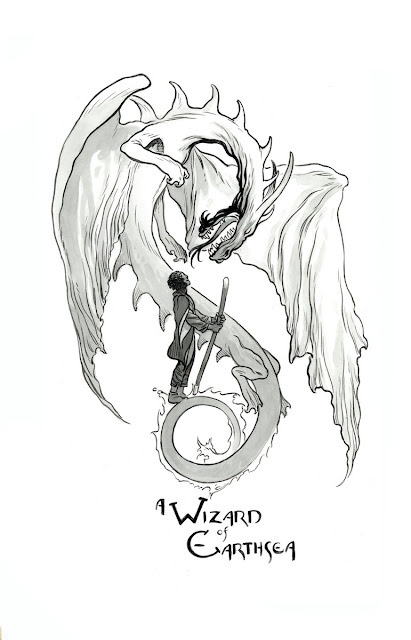

Ink illustrations from Charles Vess for "The Book of Earthsea: The Complete Illustrated Edition" by Ursula K. LeGuin
#earthsea#ursula k leguin#ursula leguin#pulp art#fantasy art#comic art#charles vess#illustration#ink illustration#black and white illustration#b&w illustration#tombs of atuan#wizard of earthsea#dragon art#dragon#earthsea books#fantasy illustration#epic fantasy
27 notes
·
View notes
Text

Spotted in Vancouver, Canada, on the side of a Dollar Tree
591 notes
·
View notes
Text

Kathleen Miles - A Sustaining Passion, 2017.
* * * *
“The creative adult is the child who survived.” - Ursula Le Guin
(Ravenous Butterflies)
39 notes
·
View notes
Text
I was wrong about Ursula K. LeGuin
I'd always thought that I liked her more as a philosopher than a writer, that while I agreed with most of her famous quotes and sayings I'd never been much for her works, outside of The Ones Who Walk Away From Omelas, where it's entirely possible I'm taking a death-of-the-author approach to it(to me it's a story about how true utopia is impossible, and that the only moral approach to a utopia for the many built on the unjust suffering of the few, or even a single innocent person, is to refuse to be a part of it and leave, to go out and try to build a society that would rather seek to help everyone while knowing it would fail rather than settle for guaranteedly helping most at the expense of the unfortunate few left over). But then it turns out that a story I read in my 8th grade English textbook, one that never left my mind over almost 2 decades from just how chillingly casual the narrator was in describing the transformation of Earth into a barren world filled with asylums for people who'd been deemed insane by a test that didn't work, was one of hers. So now here I am, encouraging you in the strongest possible terms to experience one of the greatest sci-fi short stories I've ever read, on par with those of Bradbury and Asimov. To experience the calm and ever-so-rational madness of S.Q.
#le guin#ursula k. le guin#ursula leguin#sci-fi#classic sci-fi#I get it now#i'm still not gonna turn into a devotee of her work like i am for bradbury or s. andrew swann#but when she wanted to be this woman could create the kind of world that's both incredibly impossible and yet terrifyingly believable#the kind that makes you thankful as all hell that you don't live in it#while at the same time wondering at the parallels that might exist between it and our own
5 notes
·
View notes
Text
Posca version of chapter 18 from The Left hand of Darkness.

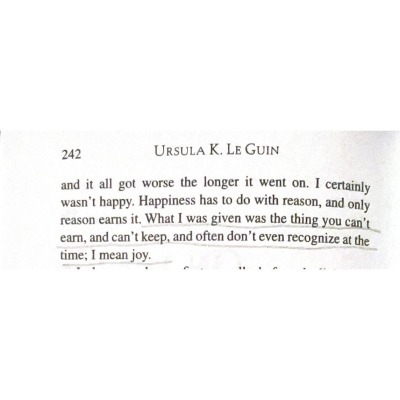
#ursula leguin#the left hand of darkness#tlhod#book#art#my art#ursula k. le guin#tan art#posca#posca markers#artists on tumblr#illustration#moleskine
79 notes
·
View notes
Text
I wonder how the omelas hole conversation would change if it was a dog in there
5 notes
·
View notes
Text
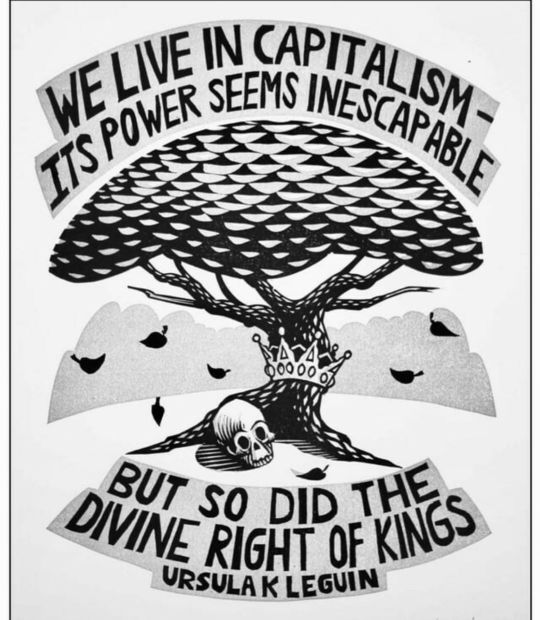
18 notes
·
View notes
Text
For me it's not enough to be a good rider, I want to be a centaur. - Ursula Le Guin
#quoteswithoutcontext
11 notes
·
View notes
Quote
The creative adult is the child who survived.
Ursula Leguin
#Ursula Leguin#quotes#life#love#important#tumblr#instagood#aesthetic#girl#literature#sad quotes#sad poem#zitate
2 notes
·
View notes
Text
A. L. Kroeber cultural anthropologist, father of Ursula LeGuin
Hi Folks, I’ve been ill with vertigo from an inner ear infection, so I’ve been reading alot and posting little. I will try to get those tasks more intune in the days that follow. Thanks. Alfred Louis Kroeber was an American cultural anthropologist who studied under famed Franz Boas at Columbia University. He received the University’s first doctorate in anthropology in 1901 on the importance of…

View On WordPress
#A L Kroeber#Grand Trine in Water#Line Of Efficiency Vigintile#Line Of Vitality Tine#Locomotive Pattern#North Node in Pisces#Theodora Kracaw Kroeber#Ursula Leguin
4 notes
·
View notes
Text
"Clouds and rain came up on the wind, which veered and gusted so wildly that there was considerable danger of the ship jibing." 🍵
0 notes
Text
Magic and Lawlessness
I have an almost irrational distaste for “hard” magic systems in literature. This is not because of any particular aversion to stories getting metaphysical. I have absolutely no problem there but it is instead because I think attempts to systematize magic have a tendency to strip the magic out of it. There is a famous quote from Arthur C. Clarke that “any sufficiently advanced technology will be…
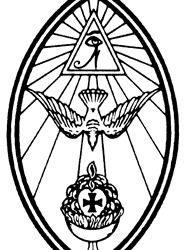
View On WordPress
#Arthur C. Clarke#Brandon Sanderson#Clarke#JRR Tolkien#law#LeGuin#magic#materialism#Sanderson#T.H. White#Ursula K LeGuin#Ursula LeGuin
1 note
·
View note
Text
this is so awesome. no more tv no more shows, lets all start reading books again. booktok losers dni
#ive been reading a book of short stories by ursula k leguin and i really want to start reading the earthsea series now#now only if online would stop falling apart then we'd be cooking with gas
4K notes
·
View notes
Text
I love that going to the library also means I find books that I wasn't even looking for but borrowed anyway that I might not even find and/or bother with if I went to a bookstore? Like I just checked out four books the last time I went to the library—went in to get Sandman by Neil Gaiman and came out with Fragile Things, Trigger Warnings, American Gods, and Lavinia (Ursula LeGuin). I fell in love with Fragile Things and it's literally helping me start writing again
unsung benefit i think a lot of ppl are sleeping on with using the public library is that i think its a great replacement for the dopamine hit some ppl get from online shopping. it kind of fills that niche of reserving something that you then get to anticipate the arrival of and enjoy when it arrives, but without like, the waste and the money.
#power of libraries#I realized how much money I would save by just borrowing from the library#ALSO the deadline helps with making me actually read the books because I know they can't just sit on the shelf forever#library#libraries#neil gaiman#ursula leguin#I'm writing a short story about the butterfly lovers but make it queer#I couldn't find Sandman but I also ran out of arm space#got skinny stick arms
96K notes
·
View notes
Text
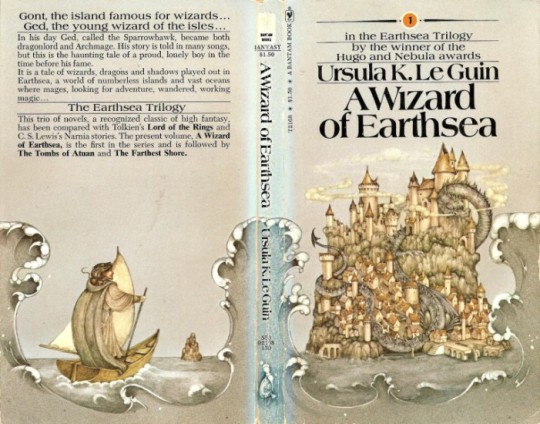
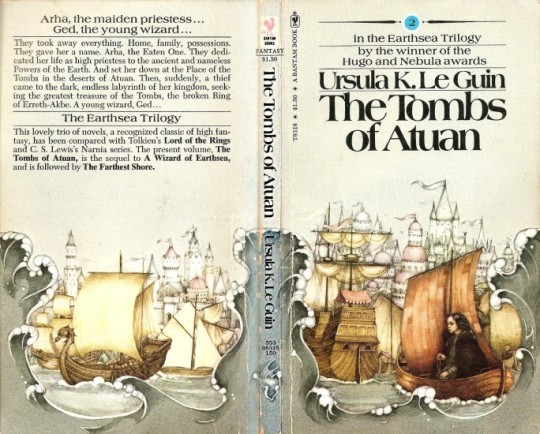
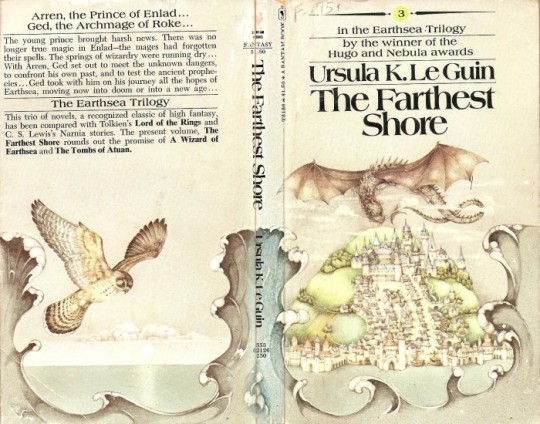
A Wizard Of Earthsea by Ursula K. LeGuin



A Wizard Of Earthsea / The Tombs Of Atuan / The Farthest Shore
Art by Pauline Ellison
Bantam Books (1975)
#Paperback Cover#Paperback Art#A Wizard Of Earthsea#Ursula K LeGuin#Pauline Ellison#Fantasy#Vintage#Art#Paperback#Paperbacks#Earthsea#The Tombs Of Atuan#The Farthest Shore#Dragons#Earthsea Trilogy#Bantam Books#Bantam#1975#1970s#70s
175 notes
·
View notes